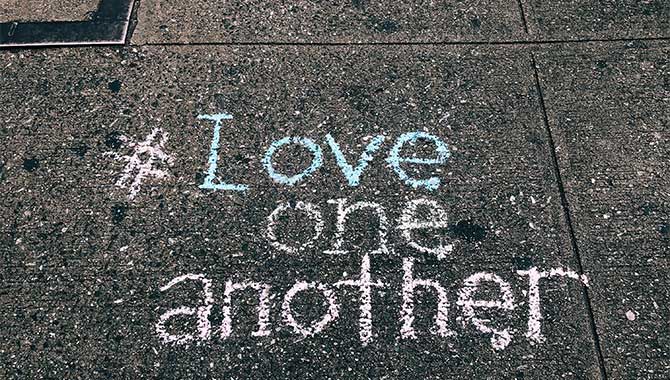February 14, 2021
Valentine’s Day
I give you a new commandment, that you love one another. Just as I have loved you, you also should love one another. ~ John 13:34
Love is a fruit in season at all times and within reach of every hand. Anyone may gather it and no limit is set. ~ Mother Teresa
Growing up, do you remember the Valentine’s Day parties we had in early elementary school? We would cut heart shapes out of construction paper, write the name of one of our classmates on the heart with a short endearing message, and sign the heart (Love, our name). Oh, and we would tape a tootsie roll, a lollipop, or a piece of gum to the card. We gave Valentines to everybody and everybody gave us one as well. For one day at least, love flourished.
As we grew older, the Valentine’s Day parties disappeared, and we became more selective in who we gave Valentine cards to. We did not want to appear foolish, or risk opening our heart to a classmate and not have that love reciprocated.
What happened? How do we get back to loving one another as Christ loved us? Who do we share or not share the grace and love of God with? Henri Nouwen writes, “Jesus calls us to continue his mission of revealing the perfect love of God in this world.”
God lets his sun shine on the bad as well as the good (see Matthew 5:45). God’s love does not discriminate; it simply embraces everything. “Like the sun, it does not shine selectively, shedding its warmth on vegetables because they are good and refusing warmth to weeds because they are bad. It just shines,” says Father Ron Rolheiser.
The Reverend Rick Warren writes, “Our culture has accepted two huge lies. The first is that if you disagree with someone’s lifestyle, ideas, or politics you must fear or hate them. The second is that to love someone means you agree with everything they believe or do. Both are nonsense.”
Amen! Who do we struggle to love?
My first-grade teacher Miss Byrd was old (at least 24) and she ran a tight ship. She had one rule which she enforced for our Valentine’s Party. “You have to give a kind Valentine to everyone (she read every note), or you don’t get any valentines.” Maybe she was a little legalistic, but she was highly effective with first graders. Miss Byrd made her point. We might not like everyone, but we can love everyone.
God loves us when we are good, and God loves us when we are bad. God loves all creatures great and small. God loves women, children, and men. God loves the serious-minded and God loves the goofballs. When we read the story of the Prodigal Father, we forget that the father “loves both sons equally, one in his weakness and the other in his bitterness” writes Rolheiser. When we love as God loves us, we meet people where they are.
Grace meets us in our good fortune and in our misfortune, our joy and our pain, our generosity and our selfishness. Love does not insist on its own way (1 Corinthians 13:5) but great love does transform us. When our hearts are strangely warmed, how do we respond? How do we live?
An elementary teacher friend I know told me about this “naughty” boy in her class who is always in trouble. Yet, the little boy will go to his teacher and sit in her lap while she holds him. The little boy and all of us just want to know if we are loved.
Father Rolheiser says, “Love, understood properly, is never a reward for being good. Goodness, rather, is always a consequence of having been loved.”
Learning to love is a life-long endeavor. There are moments when we will give and receive love perfectly; we get a glimpse of heaven. Cherish those moments. And there will be moments when we fail to love. May we be forgiving and patient with ourselves and others.
May we love as God first loved us.
May we harvest the fruit of love through prayer, meditation, and self-reflection.
May we do small things with great love.
Happy Valentine’s Day!
Blessings, peace, and love to all of you,
Craig

